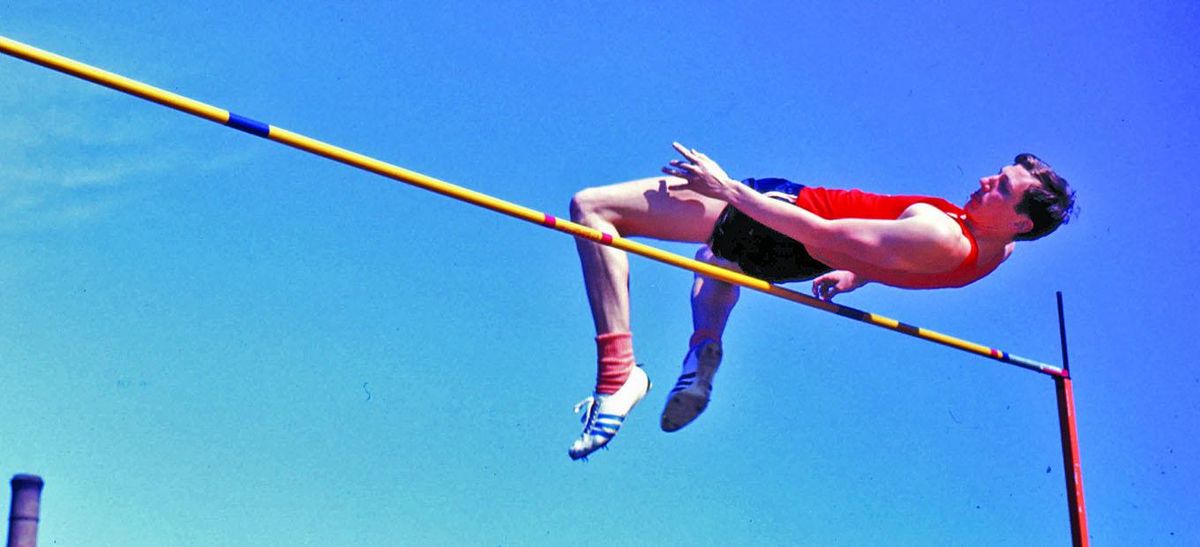The High Bar of Social Entrepreneurship

Dick Fosbury jumped into the heavens recently – living to an age where he became old enough for many to forget about his historic role in the world of sports. As I reflect on his life, I remember how I idolized him when I was a young, fledgling, and mediocre high jumper growing up in Oregon, Fosbury’s home state. A fistful of decades later, I can see that in many ways, his pioneering efforts in track and field are parallel to those of today’s social entrepreneurs.
But before we get into the social impact, let’s flop around a bit for context.
Fosbury was a true innovator, the inventor of a revolutionary new style of high jumping. Early in his career, he wasn’t getting the results he wanted using the prevailing methods of the “scissors” or “roll,” so he experimented with a new way of jumping, leveraging his hips and propelling himself “backwards” up and over the bar. Many thought him a bit crazy. Coaches advised him against it – he could hurt himself or stymie his development as a jumper.
And yet he persevered, and he improved. Even so, at the 1968 Mexico City Olympics, he and his “flop” were regarded as a novelty act. As the New York Times reported in his obituary, “The technique has been compared to a corpse being pushed out of a window. Like Fred Astaire dancing on the ceiling, Fosbury’s flopping struck many onlookers as residing somewhere between a physical feat and a joke. At the 1968 Summer Olympics in Mexico City, the crowd oohed, aahed and laughed watching Fosbury compete.”
Fosbury had the last laugh – he cleared height after height at Mexico City and won the Gold Medal with a then-Olympic record jump of 7’4-1/4”.
Forever named the “Fosbury Flop,” it transformed the event and is still the predominant style of high jumping today.
Here’s where the comparison to social entrepreneurs takes its run at the high bar. Social entrepreneurs are bent on reinventing the way we do business. Like Fosbury, we’re exploring and embracing innovative ways to change the game of conducting business – from Certified B Corporations to perpetual purpose trusts to any number of impact business models in between – all of us aiming to clear a higher bar for what companies should aspire to be. We're employing business to better the lot of stakeholders rather than just shareholders; to serve the underserved in new and novel ways; to inject positive energy into money before recirculating it as fuel in the fight against climate change.
It's not easy. It does require more work. It demands an ability to adroitly multi-task across multiple stakeholders. And it requires a finer financial pencil for making it all work.
The traditional business world increasingly pays lip service to “purpose,” but in ways that largely feel as if a box has been checked. There are still plenty of detractors and free riders looking at us with a smirk as if we’re attempting to leap backwards over something loftier than our reach, waiting for us to fail – much like those onlookers at the high jump pits did when Fosbury competed in Mexico City. All the while, we social entrepreneurs keep our fires stoked with the inspirational dream that our evolving, new business models for social and environmental impact will one day become the operating standard of the future, much as the Fosbury Flop became for high jumping.
Dick and I both wound up moving from Oregon to Idaho; he to Sun Valley where he built an engineering firm and a life of community service to the Wood River Valley, and I later landed in Boise for a career pursuing social impact. While we never met, at some point we connected on Twitter, and I always got a childish kick out of it when he liked or retweeted one of my tweets. Once a childhood idol, always a childhood idol. #RIPDickFosbury
